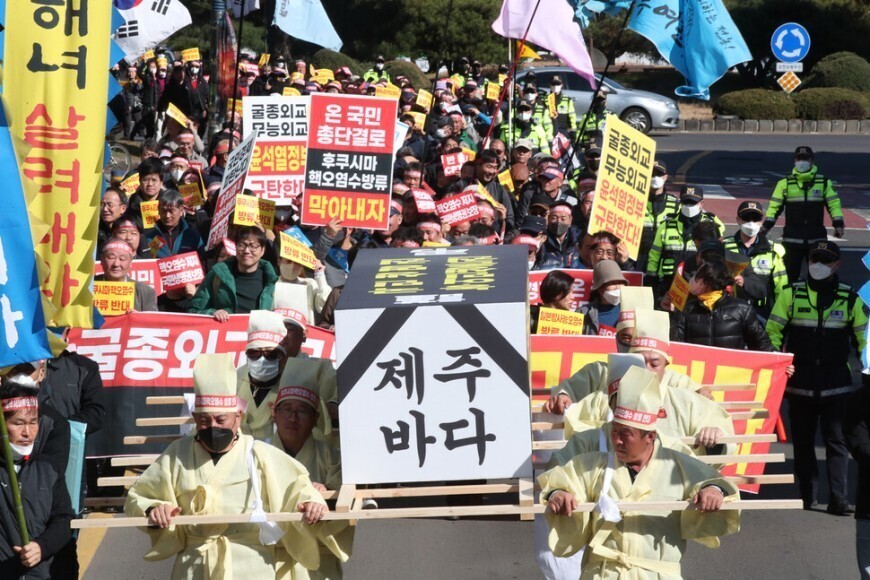hankyoreh
Links to other country sites 다른 나라 사이트 링크
[Correspondent’s column] Calling concerns about Fukushima water “scaremongering” is the real fake news


The release of irradiated water stored at TEPCO’s Fukushima Daiichi nuclear power plant into the sea seems to be around the corner.
The Japanese government will begin the discharge in June, once the International Atomic Energy Agency (IAEA), which was tasked with verifying the safety of the contaminated water, releases its final report.
The more than 1.3 million tons of contaminated water that was used in the response to the 2011 nuclear meltdown will be released over around 30 to 40 years. Because of the unprecedented nature of the situation, many in South Korea are raising concerns.
The damage to South Korea’s fishing industry, which borders Japan, seems obvious, since consumers will feel uneasy about the safety of seafood. South Korea is the world’s No. 1 consumer of seafood per capita.
Despite the gravity of the situation, the administration of President Yoon Suk-yeol in Korea has been repeating the same rhetoric for over a year, saying that it will “engage in scientific and objective verification for the sake of public health.”
The ruling People Power Party has been engaging in a full-scale war against the opposition over what it calls “baseless rumors” surrounding this issue.
On Wednesday, the ruling party devoted a significant amount of time regarding “scaremongering baseless rumors” by the opposition party during a meeting with ministers and the government inspection team that visited Fukushima.
“The Democratic Party’s ‘radioactivity scaremongering’ is pushing fishermen into a corner,” they said. “We mustn’t let the fishing industry shutter by starting the second ‘mad cow disease’ scare simply for political purposes.” You get the picture.
These arguments ignore the underlying causes for the worries surrounding this issue and have gotten basic facts wrong.
Long before the Democratic Party started pushing on the issue, Korean consumers were reporting that they would reduce their seafood consumption if Japan released the wastewater. For example, in April 2021, when the Japanese government decided to release the contaminated water, Consumers Korea surveyed 500 people and found that 91.2% of respondents said they would reduce their seafood consumption if the contaminated water was released.
No country in the world has ever discharged contaminated water on such a massive scale, and even world-renowned scientists are uncertain when it comes to its safety. It’s no wonder that consumers are nervous.
Of course Koreans are sensitive to environmental issues. Korea has seen the ruinous effects that chemicals can have on the human body in the case of the humidifier disinfectant scandal. Children cannot run around freely due to air pollution, and natural disasters associated with climate change have rocked the country.
In Japan, where the contaminated water is called “ALPS-treated water” (for its Advanced Liquid Processing System) and advertisements practically inculcate people into believing that the water is safe, consumers are equally anxious.
The Japanese government considers the decrease in seafood consumption as natural and, unlike Korea, has taken special measures. The Ministry of Economy, Trade and Industry has already set aside 80 billion yen (about US$574 million) in funds to soften the blow to fisheries.
TEPCO has decided to compensate individual victims without limitation on location, industry, or duration, because TEPCO recognizes that what’s causing the damage to fisheries and other industries is the discharge of contaminated water itself.
If Yoon and the ruling party are serious about public health and the fishing industry, they should stop complaining about “scaremongering” and make headway on two things: clarifying the South Korean government’s position on the safety of contaminated water, and coming up with practical measures for the fishing industry.
The damage caused by Japan’s wastewater discharge will not be limited to South Korea, but will directly affect neighboring countries, damages claims against TEPCO should also be considered.
The government has an obligation to reduce risks as much as possible to protect the lives and health of its citizens. This is what the South Korean government emphasized in April 2019 when it managed to win a World Trade Organization case against Japan over a ban on imports of Fukushima seafood.
A change of government does not change a country’s obligations.
Please direct questions or comments to [english@hani.co.kr]

Editorial・opinion
![[Editorial] Perilous stakes of Trump’s rhetoric around US troop pullout from Korea [Editorial] Perilous stakes of Trump’s rhetoric around US troop pullout from Korea](https://flexible.img.hani.co.kr/flexible/normal/500/300/imgdb/original/2024/0509/221715238827911.jpg) [Editorial] Perilous stakes of Trump’s rhetoric around US troop pullout from Korea
[Editorial] Perilous stakes of Trump’s rhetoric around US troop pullout from Korea![[Guest essay] Preventing Korean Peninsula from becoming front line of new cold war [Guest essay] Preventing Korean Peninsula from becoming front line of new cold war](https://flexible.img.hani.co.kr/flexible/normal/500/300/imgdb/original/2024/0507/7217150679227807.jpg) [Guest essay] Preventing Korean Peninsula from becoming front line of new cold war
[Guest essay] Preventing Korean Peninsula from becoming front line of new cold war- [Column] The state is back — but is it in business?
- [Column] Life on our Trisolaris
- [Editorial] Penalties for airing allegations against Korea’s first lady endanger free press
- [Editorial] Yoon must halt procurement of SM-3 interceptor missiles
- [Guest essay] Maybe Korea’s rapid population decline is an opportunity, not a crisis
- [Column] Can Yoon steer diplomacy with Russia, China back on track?
- [Column] Season 2 of special prosecutor probe may be coming to Korea soon
- [Column] Park Geun-hye déjà vu in Yoon Suk-yeol
Most viewed articles
- 1Nuclear South Korea? The hidden implication of hints at US troop withdrawal
- 2‘Free Palestine!’: Anti-war protest wave comes to Korean campuses
- 3[Editorial] Perilous stakes of Trump’s rhetoric around US troop pullout from Korea
- 4In Yoon’s Korea, a government ‘of, by and for prosecutors,’ says civic group
- 5With Naver’s inside director at Line gone, buyout negotiations appear to be well underway
- 6[Photo] ‘End the genocide in Gaza’: Students in Korea join global anti-war protest wave
- 7Seoul getting its first-ever vertical farm
- 8Gangnam murderer says he killed “because women have always ignored me”
- 9‘We must say no’: Seoul defense chief on Korean, USFK involvement in hypothetical Taiwan crisis
- 10Korean president’s jailed mother-in-law approved for parole